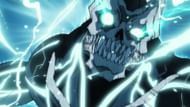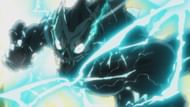After a five-year run, the Kaiju No. 8 manga has come to an end with a total of 129 chapters. Following the conclusion of Jujutsu Kaisen and My Hero Academia, Kaiju No. 8 now joins the list of recently finished new-generation Shonen titles, but with just 129 chapters, its run feels notably shorter.
Naoya Matsumoto-san’s manga made waves in the Shonen manga scene soon after it began publishing in July 2020. It gained significant popularity for its premise and action, but the pacing began to falter noticeably as the story progressed.
By the final chapter, released on Thursday, July 18, 2025, it felt like the story wrapped up almost too abruptly. Much like the conclusions of Jujutsu Kaisen or My Hero Academia, Kaiju No. 8 manga’s ending leaves several major plot points and mysteries unresolved, but this time, it feels even more so.
Disclaimer: This article contains spoilers from the Kaiju No. 8 manga.
After Jujutsu Kaisen and My Hero Academia, Kaiju No. 8 manga wraps up with a hurried conclusion
With the Kaiju No. 8 manga coming to an end through an abruptly fast-paced conclusion—following in the footsteps of Jujutsu Kaisen and My Hero Academia—disappointment within the Shonen community has grown further. In this case, however, the dissatisfaction feels much greater than with the other two series, both of which concluded their runs in 2024.
My Hero Academia ended after a decade-long serialization, while Jujutsu Kaisen ran for six years. Both followed a weekly release schedule, allowing more room for story development, character arcs, and world-building. In contrast, Kaiju No. 8 manga started off as a weekly release but later shifted to a biweekly schedule.
Naturally, this meant less frequent content, and the manga’s scope to expand the plot became noticeably narrower. The pacing started to feel rushed not long after Kaiju No. 9 appeared and Kafka was arrested.
 Kaiju No. 8 manga closes with a hasty pacing (Image via Production I.G)
Kaiju No. 8 manga closes with a hasty pacing (Image via Production I.G)Once Kaiju No. 9 took over Chief Shinomiya, things accelerated even more. Kafka’s training and the growth arcs for other characters felt extremely brief. Reno Ichikawa, for example, hardly got a real chance to shine in the final battle against Kaiju No. 9 or the Meireki-era Mega Monster.
Despite all Reno's buildup, character development, flashy abilities, and power-up from wielding Kaiju No. 6’s weapon, those elements went to waste. The story barely highlighted his contribution.
Similarly, characters like Iharu, Haruichi, Aoi, and others received almost no focus. Iharu’s power-up system, which showed promise, remained significantly underexplored. Kikoru was shown wielding two Kaiju weapons, yet her actual combat scenes with that power were limited. Even Kafka’s ultimate power-up felt underdeveloped.
The manga also left key questions unanswered. The origins of the Kaiju, their purpose, motivations, and mysteries surrounding their existence all remained unexplored. There’s only a brief mention of Kaijus originating from the ocean’s deepest depths, but that’s as far as it goes.
 Kaiju No. 8 manga ends with 129 chapters (Image via Production I.G)
Kaiju No. 8 manga ends with 129 chapters (Image via Production I.G)In the final chapter, readers saw Kafka still retaining his Kaiju No. 8 powers, but the story never properly explained how or why. It hints that it might have something to do with Chief Shinomiya’s actions or the Edo-era Samurai’s wish, but no clear answer is provided.
Most frustratingly, Kafka and Mina never got a proper, personal reunion scene. Their relationship had been a central thread, yet it felt like the story forgot to give them that final moment together. Instead, the manga closes with Kafka standing alongside the Defense Force, the Kaiju threat implied to still exist, but without giving readers a sense of true closure.
While both Jujutsu Kaisen and My Hero Academia wrapped up with some lingering questions, most plotlines were at least explained. With Kaiju No. 8 manga, the story feels largely unfinished, like watching a movie that focuses only on some chapters of the protagonist’s life, only to fade to black before their journey is truly resolved.
Final thoughts
After following the characters for five long years, Kaiju No. 8 manga’s ending leaves the fandom with a lingering sense of dissatisfaction, especially given the series' scope and potential. Instead of delivering a clear and definitive conclusion, the story closes in a way that feels more like a midpoint in Kafka Hibino’s ongoing journey rather than its true finale.
Readers are left wondering what happens next, feeling as though the narrative simply paused instead of fully developing. It’s not so much an ending as it comes across as an unfinished season, leaving the story incomplete rather than truly concluded.
While it carries a certain message about life going on and stories never truly ending, the narrative ultimately makes for a solid story, only undermined by its rushed conclusion, and it clearly leaves room for expansion through a sequel or spin-off.
Also read:
- Dandadan season 2 episode 3: Okarun defeats the Evil Eye as the Tsuchinoko’s demise triggers a volcanic eruption
- The Summer Hikaru Died episode 2: Yoshiki uncovers more about the imposter Hikaru as they experience an eerie entity
- Boruto: Two Blue Vortex chapter 24 sneak peek shows Kawaki overpowering Jura
Why did you not like this content?
- Clickbait / Misleading
- Factually Incorrect
- Hateful or Abusive
- Baseless Opinion
- Too Many Ads
- Other
Was this article helpful?
Thank You for feedback
About the author
Edited by Shubham Soni

.jpg) 3 hours ago
1
3 hours ago
1

 English (US)
English (US)